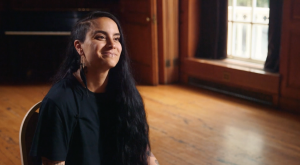The Tireless Sonya Tayeh
Description
If you’re looking for choreography that is as dense with emotion as it is with intense physicality, look no further than Sonya Tayeh.
Featured Artists

Sonyah Tayeh is an award-winning choreographer for TV, musical theater, and performing artists. She is known for her work on the television show So You Think You Can Dance, which won her two Emmy nominations.
Born in Brooklyn and raised in Michigan, Tayeh started dancing at age 15. She graduated with a BA in dance from Wayne State University in 2002 and was hired by the Fox TV show So You Think You Can Dance in 2008. Following her success on the show, she choreographed for Madonna, Florence + the Machine, Kylie Minogue, Miley Cyrus, and other successful musicians. She has also received commissions from major dance companies Martha Graham Dance and Los Angeles Ballet.
In 2010, she choreographed the rock musical The Last Goodbye, a version of Romeo and Juliet set to music by Jeff Buckley. Her work on Kung Fu, an Off-Broadway dance-play based on Bruce Lee’s life, won an Obie Award in 2014. She was nominated for a Tony Award in 2020 for her choreography for a revival of Moulin Rouge.
Transcript
The choreographer Sonya Tayeh moves through the world with a clear sense of purpose.
Sonya Tayeh: What I was taught in my life was to honor who you are, to live life with honesty and trust, and live it as full as you can. And if you’re gonna do it, do it right.
And Tayeh has been doing right by dance for the past two decades. But she came to national attention in 2008 on the hit competition show, So You Think You Can Dance. Before long, she was choreographing for stars like Florence and the Machine, Miley Cyrus, and Madonna. There’s also been musical theater work, including Kung Fu, a retelling of Bruce Lee’s life, a star-studded, live TV version of the iconic show Rent, and the Broadway revival of Moulin Rouge. All this, plus commissions from heavyweight companies like Martha Graham Dance and Los Angeles Ballet. But despite her successes, Tayeh remains pretty self-deprecating. She says her greatest strength is simple, being relentless.
Tayeh: I know when I’m lazy, I know when I’m phoning stuff in, or going into the things that are comfortable for me. When I am challenged, when I am terrified, when I am not knowing the answers, I’m my most fulfilled.
But this fulfilling life in dance was not supposed to be possible for Tayeh, who came to dance unfashionably late. At 17, she was the oldest beginner many of her teachers had ever seen, but Tayeh was determined, and took her fundamentals classes with young children. At age 25, she graduated from Wayne State with a degree in dance, having finally found mentors who understood what she had to offer, and how she needed to grow.
Tayeh: A lot of the professors had their own individual techniques, which then helped me celebrate my own. And understanding about how I wanted to move and how I saw movement. I worked really, really hard for a long time, and it was devastatingly difficult, but I loved every second of it.
AJC: Did it seem like there was gonna be anything else that would hold your attention in such a way? It was always gonna be dance?
Tayeh: No, no, no. I’m obsessed with it. I love it so much. It is torture, and comfort, all at the same time. I feel like I wake up, I open the door to the studio, and I’m staring at a mirror, all day. I never have mirrors in my room, but I’m looking at myself every day. All of my flaws, all of my questions, all of my limitations, over and over. But how alive is that?
Tayeh (in rehearsal): You’re trying to clean and wrap the wounds. And rebuild them. It’s like saying, “If my words aren’t enough, maybe if I place my heart close to yours, you could hear that it beats the same.” Or maybe, “If you smell my sweat like yours, if I can remind you of… The connection maybe will change.”
Tayeh has a seemingly insatiable thirst for deeply felt experiences, both in and outside of the studio. She’s often praised for the visceral quality of her choreography, the angular, emotive, explosive nature of her movements. This intensity, she says, is rooted in her understanding of life’s fleeting nature. By her mid-20s, Tayeh had witnessed the deaths of her father, a beloved cousin, and two close friends, experiences which fed a sense of urgency about her own life, that’s fueled her ever since.
Tayeh: My innate sensibility has a highly physical, very passionate approach to things, because I think when I wondered why that was that way, I realized that I had a beautiful, beautiful life, thank God, but I experienced a lot of loss in my life, which brought an anxiety. So, I think there’s a lot of passion because of time. Everything that I do, my thought process, which, once I thought was dark and now I think is light, is because of loss, is because this life is this small. So, I don’t have time to concern myself with all of the other stuff. What I do have time for is to truth-seek, because it’s going to go by this fast.
And so Sonya Tayeh continues to harness her sensitivities to those things that affect us all, to make dance that’s profoundly affecting.

